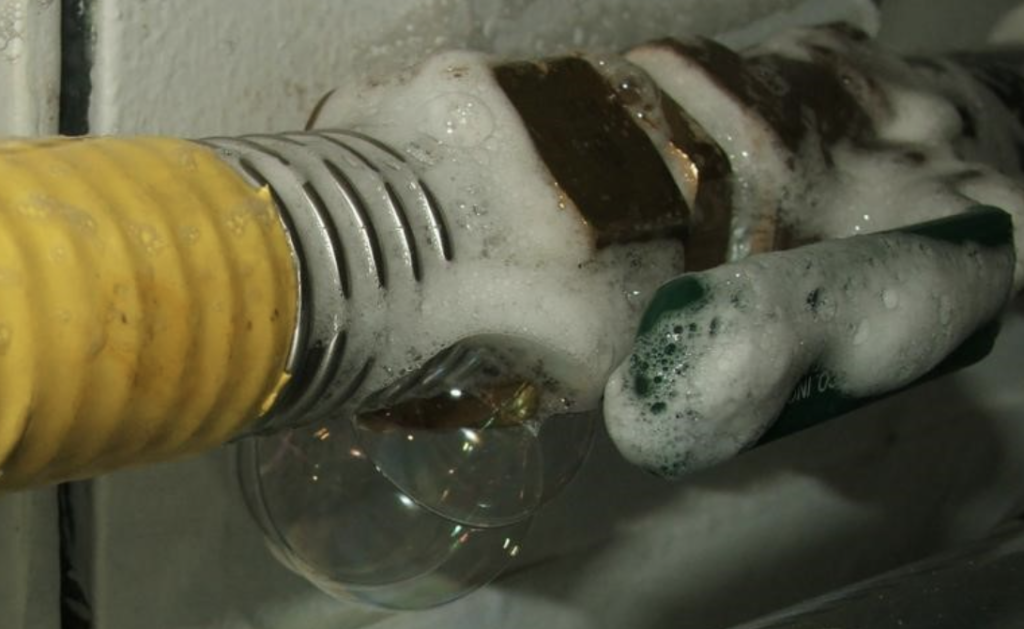Air Conditioner Leaking Freon? Find out why and how to fix it.
Air Conditioner Leaking Freon giving you headache? You are in the safe place to know why.The inadvertent leakage of the refrigerant known as freon from the cooling system is referred to as an air conditioner leak.
Freon plays a critical part in the air conditioning process by absorbing and releasing heat to cool indoor environments. Freon is normally a colorless gas or liquid.
At a glance:Air Conditioner Leaking Freon due to Improper Installation,Metal Erosion,Factory Defects or Wear and Tear.
Because freon has a negative effect on the ozone layer, when a leak occurs it impairs the system’s effectiveness and cooling capacity and raises environmental issues.
In addition to maintaining cooling function, finding and fixing these leaks is crucial for ensuring compliance with environmental laws and averting any health risks.
N.B – The words “Freon’’ is often used interchangeably with the word “Refrigerant”.
Related Post>>>>air conditioner makes whooshing noise.
Causes of Air Conditioner Leaking Freon.

*Improper Installation:
An improperly installed air conditioning unit may eventually develop freon leaks. This happens when seals, connectors, or lines for refrigerant are improperly installed during setup.
These installation mistakes lead to holes that eventually let freon out. Hiring a trained HVAC specialist with experience in correct installation methods is essential to resolving this problem.
Regular checks and upkeep can also aid in spotting and fixing installation-related problems before they become leaks.
*Metal Erosion:
The corrosive effects of moisture, impurities, or chemical interactions with the refrigerant itself can cause metal erosion within the AC system. T
he components of the system may become less sturdy over time due to this erosion, leading to freon leaks.
Use a high-quality, corrosion-resistant AC system to combat this, make sure the system is properly sealed and insulated, and perform routine maintenance to identify and fix erosion-related issues early.
*Factory Defects:
Weak welds, malfunctioning valves, or poor material quality are examples of factory flaws that might appear in the production of AC components.
Shortly after installation or over time as the system experiences wear and tear, these flaws may result in freon leaks.
It’s crucial to get reputed brands and models with a track record of quality control if you want to solve this problem.
When there are manufacturing flaws, warranty protection can aid by ensuring prompt replacement or repair.
*Wear and Tear:
Freon leaks are frequently caused by the deterioration of an AC system.
Coils, pipelines, and seals inevitably deteriorate over time as a result of use and exposure to the environment. Cleaning, lubrication, and seal replacements done on a regular basis can help the system last longer and lower the chance of freon leakage.
Additionally, it is possible to stop wear and tear from developing into significant leaks by rapidly fixing any unexpected noises, temperature changes, or performance problems.
General fixes of a leaking Air conditioner.
*Access the Condensate Drain Pipe
One of the most important steps in fixing a leaky AC system is to gain access to the condensate drain pipe.
Excess moisture produced during the cooling process is eliminated by the condensate drain pipe.
The clogging or obstruction of this pipe may cause water to back up and leak into your house. Observe these steps to gain access to the condensate drain pipe:
- Turn off the AC unit: Ensure the AC system is powered off to avoid any electrical hazards during the process.
- Locate the drain pipe: Find the condensate drain pipe, which is typically located near the indoor air handler or furnace unit.
- Remove the access panel: If there is an access panel covering the drain pipe, carefully remove it to gain access to the pipe.
- Inspect for clogs: Examine the drain pipe for any visible clogs, debris, or algae growth. Use a flashlight to help identify blockages.
- Clear the clog: If you find a blockage, use a stiff brush, pipe cleaner, or a wet/dry vacuum to clear the obstruction gently.
- Flush with water: After clearing the clog, flush the drain pipe with a mixture of water and vinegar to prevent future build-ups.
- Replace the access panel: Secure the access panel back in place and ensure it is sealed properly.
Accessing and cleaning the condensate drain pipe is a simple yet effective solution to prevent AC leakage caused by clogs and blockages.
Also read>>>>>Window AC Unit Leaking Water Inside.
*Clean out the pipe.
Cleaning out the condensate drain pipe is a vital maintenance task to prevent AC leaks.
Over time, this pipe can accumulate debris, algae, and mold growth, leading to blockages and water overflow. To clean the drain pipe, follow these steps:
- Turn off the AC: Ensure the AC unit is powered off to prevent any accidents while working on the drain pipe.
- Locate the drain pipe: Find the condensate drain pipe, typically near the indoor air handler or furnace.
- Remove clogs: Use a stiff brush, pipe cleaner, or wet/dry vacuum to clear any visible clogs and debris from the pipe. Be gentle to avoid damaging the pipe.
- Use a cleaning solution: Mix equal parts water and vinegar, and pour it into the drain pipe. This helps to dissolve any remaining algae or mold growth inside the pipe.
- Allow it to sit: Let the cleaning solution sit in the pipe for about 30 minutes to thoroughly clean and disinfect it.
- Rinse with water: Flush the drain pipe with clean water to remove any remaining residue and ensure it’s clear of debris.
- Reassemble and test: Replace any access panels and turn on the AC unit to confirm that water flows freely through the drain pipe without leakage.
Also read>>>>Air conditioner Keeps tripping Breaker.
*Replace the filters.
Your AC system’s filters need to be changed regularly as part of routine maintenance to maintain leak prevention and effective functioning.
Filters that are clogged or unclean might prevent airflow, causing the evaporator coils to freeze and perhaps resulting in water leaks. Follow these steps to replace the filters:
- Turn off the AC: Ensure the AC unit is powered off before attempting to replace the filters.
- Locate the air filter(s): Typically, air filters are located in or near the return air duct or grille. Consult your AC system’s manual for specific instructions on filter replacement and location.
- Remove the old filter(s): Carefully remove the existing filter(s) from their housing. Pay attention to the filter’s orientation, as it must be inserted correctly.
- Inspect the new filter: Check that the new filter is the correct size and type for your AC system. Ensure it matches the filter rating recommended by the manufacturer.
- Install the new filter: Insert the new filter into the housing, following the arrows or indicators for proper orientation. Ensure it fits securely.
- Reassemble and test: Replace any access panels or covers, and then turn on the AC unit to verify that it operates smoothly with the new filter in place.
Regularly replacing your AC filters, typically every 1 to 3 months depending on usage and filter type, is a simple yet effective way to prevent leaks, maintain indoor air quality, and improve the overall efficiency of your cooling system.
Also read>>>Air Conditioner Keeps Turning On & Off.
Other related Questions.
Signs that my Air conditioner is leaking.
–High Utility Bills
Unexpected increases in your utility bills are one indication that your air conditioner is leaking.
The AC system needs to work more and operate longer to maintain the required indoor temperature when freon levels drop as a result of a leak.
Higher electricity bills are the outcome of this increasing energy demand. Have your AC system checked for possible freon leaks if you observe a big and inexplicable increase in your cooling bills.
Not only will you save money by fixing the leak right away, but freon emissions will have less of an influence on the environment.
–Longer Cooling Time
A cooling system running low on freon may have trouble effectively cooling your room. Even if the AC is constantly running, you could find that it takes longer for the room to achieve the ideal temperature.
This delay happens as a result of the system’s inability to adequately absorb and release heat due to the low freon level. Have a skilled technician check for leaks in your AC system and recharge it with the proper quantity of freon to prevent pain and extended cooling times.
–Increased Humidity
The effectiveness of an AC system’s air dehumidification can be hampered by insufficient freon levels.
As a result, even while the AC is running, you might notice higher indoor humidity levels. In addition to making your home uncomfortable, high humidity can foster the growth of mold and mildew.
It’s a clear sign of a freon leak if you observe a steady increase in interior humidity levels together with decreased cooling effectiveness.
Freon will need to be added to the system in order to fix the leak and restore proper dehumidification and comfort.
Also read>>>>Rheem Air Conditioner Problems.
–Hissing Sound
Your air conditioner may hiss loudly, which is a surefire indication of a freon leak. As freon leaks out of tiny fissures or breaches in the refrigerant lines or parts, a hissing sound is produced.
It’s critical to quickly turn off your AC system and seek professional assistance if you hear this sound.
Running the air conditioner when there is a freon leak might make things worse and possibly worsen system damage. To maintain optimum functioning, a professional technician can identify the leak’s location, fix it, and recharge the system.
–Lower Airflow
A freon leak may be indicated by a decrease in the airflow coming from your AC vents. Low freon levels cause the system’s cooling capacity to decline and its air output to decrease.
The air blowing out of the vents may feel cozier and less powerful than usual. Comfort is hampered by this reduced airflow, which also increases the time it takes to chill your room.
Have your AC system checked for freon leaks if you detect a discernible decrease in airflow and poorer cooling performance.
If you take care of the leak right away, your home’s airflow and cooling performance will be restored.
Is Air conditioner leaking freon dangerous.
Yes,when your Air conditioner is leaking freon,it exposes you to danger.Here are the symptoms of freon poisoning;
–Dizziness
One of the initial signs of AC freon poisoning, which happens when someone breathes in or is exposed to freon gas, also known as refrigerant, is dizziness.
Freon replaces oxygen in the air, depriving it of oxygen. This may cause a feeling of unsteadiness, lightheadedness, and dizziness.
People may have trouble staying balanced and feel as though they are ready to pass out.
It’s critical to leave the area right away, get some fresh air, and get medical help if you think you may have been exposed to freon and feel queasy when close to an AC unit.
–Nausea
Another typical sign of AC freon poisoning is nausea. Freon exposure can irritate the respiratory system and cause the body to generate substances that cause nausea and vomiting.
You could get nausea and vomiting if you breathe in freon gas or are exposed to it for a long time. When exposed repeatedly, these symptoms could become more severe.
If you experience persistent nausea, you must leave the contaminated area, obtain some fresh air, and see a doctor.
–Trouble Breathing
When freon gas obstructs the normal passage of oxygen into the bloodstream, it can cause serious symptoms of AC freon poisoning, including breathing difficulties.
People may have trouble breathing, feel short of breath, or even hyperventilate as freon replaces oxygen in the air.
This disorder needs quick medical attention since it may be fatal. If you or someone nearby has trouble breathing close to an AC unit, go outside and call for emergency medical help right away.
–Fluid Build-up in the Lungs
People who suffer from severe AC freon poisoning may develop pulmonary edema, which is characterized by the buildup of fluid in the lungs.
This happens as a result of freon’s harmful effects on lung tissues, which can cause serious respiratory distress.
Severe breathlessness, frothy pink or blood-tinged sputum coughing, and a suffocating sensation are other symptoms.
As a medical emergency, pulmonary edema requires prompt hospitalization and expert care.
This degree of freon exposure can be fatal, underscoring the significance of prompt action and prevention through adequate AC system maintenance and safety precautions.
Read to explore more on Air conditioner>>>>smallest portable air conditioner
Conclusion.
Maintaining the effectiveness and durability of your cooling system depends on addressing a leaking AC system with three common remedies – accessing the condensate drain line, cleaning it, and routinely changing filters.
In addition to preventing water leaks, proper maintenance also guarantees top performance and a healthy indoor environment.
Water overflow risk is decreased by routinely cleaning the condensate drain pipe to remove obstructions and blockages.
In addition, regular airflow is encouraged by changing filters at the suggested intervals, eliminating evaporator coil freeze-ups that might cause leaks.
You may enjoy dependable cooling comfort and lower your chance of expensive repairs and water damage by including these maintenance tasks in your regimen for caring for your air conditioner.

